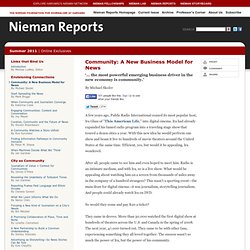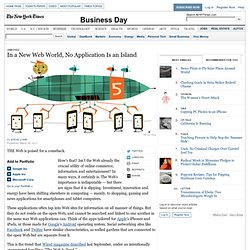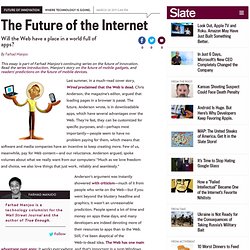

Community: A New Business Model for News. A few years ago, Public Radio International coaxed its most popular host, Ira Glass of "This American Life," into digital cinema.

Ira had already expanded his famed radio program into a traveling stage show that toured a dozen cities a year. With this new idea he would perform one show and beam it live to hundreds of movie theaters around the United States at the same time. Efficient, yes, but would it be appealing, Ira wondered. After all, people came to see him and even hoped to meet him. Radio is an intimate medium, and with Ira, so is a live show. So would they come and pay $20 a ticket? They came in droves. This isn't a brilliant new insight. Connection as a Strategy We are social beings. Clay Shirky, a professor at New York University who studies the effects of the Internet on society, writes eloquently of how technology is unleashing the greatest wave of social communication and collaboration in our history.
Facebook, LinkedIn and Twitter are the icons of the social economy. What are you working on? HTML5 Is Breathing New Life Into the Web. How’s that?

Isn’t the Web already the crucial utility of online commerce, information and entertainment? In many ways, it certainly is. The Web’s importance is indisputable — but there are signs that it is slipping. Investment, innovation and energy have been shifting elsewhere in computing — mainly, to shopping, gaming and news applications for smartphones and tablet computers. These applications often tap into Web sites for information on all manner of things. This is the trend that Wired magazine described last September, under an intentionally exaggerated headline: “The Web Is Dead.” And Tim Berners-Lee, the Web’s creator, issued a warning in the December issue of Scientific American.
But the Web’s fortunes may soon brighten remarkably. The Web browsing software that is needed to bring HTML5 to life has recently arrived. The technology, by all accounts, is an innovative achievement. There are also potentially sweeping business implications, executives and investors say. Will the Web have a place in a world full of apps? - By Farhad Manjoo. Last summer, in a much-read cover story, Wired proclaimed that the Web is dead.

Chris Anderson, the magazine's editor, argued that loading pages in a browser is passé. The future, Anderson wrote, is in downloadable apps, which have several advantages over the Web. They're fast, they can be customized for specific purposes, and—perhaps most importantly—people seem to have no problem paying for them, which means that software and media companies have an incentive to keep creating more. Few of us, meanwhile, pay for Web content—and our reluctance, Anderson argued, spoke volumes about what we really want from our computers: "Much as we love freedom and choice, we also love things that just work, reliably and seamlessly. "